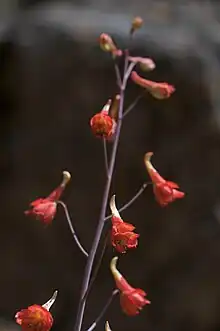| Delphinium nudicaule | |
|---|---|
 | |
| Scientific classification | |
| Kingdom: | Plantae |
| Clade: | Tracheophytes |
| Clade: | Angiosperms |
| Clade: | Eudicots |
| Order: | Ranunculales |
| Family: | Ranunculaceae |
| Genus: | Delphinium |
| Species: | D. nudicaule |
| Binomial name | |
| Delphinium nudicaule | |
Delphinium nudicaule, known by the common names canyon larkspur, red larkspur, orange larkspur, and canyon delphinium, is a flowering herbaceous perennial plant in the buttercup family Ranunculaceae. It is native to low-elevation canyons and slopes, foothills, and mountain ranges of California, US, from the Sierra Nevada to the California Coast Ranges, and of Oregon. It grows below 6,500 feet (2,000 m).[1]
The plant sends up thin and long 1–2 feet (0.30–0.61 m) stems with finely dissected leaves.[1] It bears attractive larkspur flowers in shades of red and orange that are generally pollinated by hummingbirds.[1][2] D. nudicaule readily hybridizes with several other species of Delphinium.[2]
Uses
The root of Delphinium nudicaule has been historically used as a medicinal narcotic, chiefly by the Mendocino Native Americans of the Yuki tribe. The Concow tribe called the plant sō-ma’ in the Konkow language, and sō-ma’ yem (root).[3][4]
Phytochemistry
The first phytochemical study of this plant was carried out by Michael Benn and Palaniappan Kulanthaivel at the University of Calgary in Canada.[5] These researchers reported the presence of a number of diterpenoid alkaloids: hetisine, 2-dehydrohetisine, 6-deoxydelcorine, dictyocarpine, dihydrogadesine, methyllycaconitine, lycoctonine, takaosamine, nudicaulamine, nudicauline, and nudicaulidine.
The presence of these alkaloids in D. nudicaule implies that the plant is likely to be quite poisonous. The LD50 for MLA is ~5 mg/kg, i.v., in the mouse, and the LD50 for nudicauline is ~3 mg/kg, i.v., in the mouse.[6]
References
- 1 2 3 NPIN: Lady Bird Johnson Wildflower Center Native Plant Database — Delphinium nudicaule (Red larkspur) . accessed 1.10.2013
- 1 2 Jepson Flora Project: Jepson eFlora — Delphinium nudicaule
- ↑ Chesnut, Victor King (1902). Plants used by the Indians of Mendocino County, California. Government Printing Office. p. 407. Retrieved 24 August 2012.
- ↑ University of Michigan (Dearborn): Native American Ethnobotany — 'Delphinium nudicaule' . accessed 1.10.2013
- ↑ P. Kulanthaivel and M. Benn (1985) Heterocycles 23 2515-2520.
- ↑ K. E. Panter et al. (2002) Biochem. Syst. Ecol. 30 113-128.
External links
- Jepson Manual Treatment: Delphinium nudicaule
- Univ. of Michigan: Ethnobotany
- Delphinium nudicaule — U.C. Photo gallery